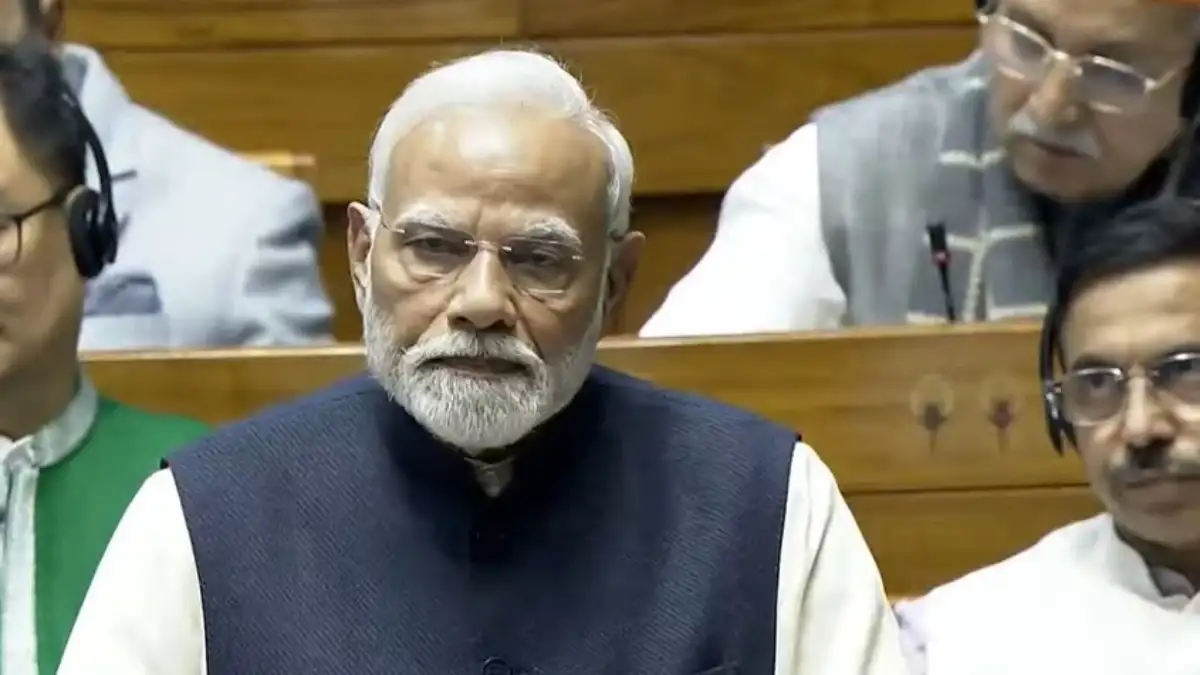
Prime Minister Narendra Modi delivered a significant address in the Lok Sabha on Saturday, commemorating the 75th anniversary of India’s Constitution. The Prime Minister highlighted the profound importance of the Constitution in shaping India’s democratic journey, emphasising its exceptional role and its relevance for all democracy-loving people worldwide.
Celebrating 75 years of constitution
PM Modi began by describing the 75th anniversary as a moment of immense pride, not just for India, but for the entire world. “For all of us, for all citizens, and for all democracy-loving people across the world, this is a moment of great pride,” he said.
He further emphasised that the anniversary was an event worth celebrating. “The 75 years of the Constitution have been memorable. The 75th anniversary of the adoption of the Constitution is an event to celebrate. I am extremely glad that Parliament is participating in this important occasion,” PM Modi remarked.
A remarkable achievement of 75 years
PM Modi underscored the extraordinary nature of this achievement, noting that India’s Constitution has helped the nation overcome challenges and doubts expressed at the time of independence. “This achievement of 75 years is not ordinary, it is extraordinary. India’s Constitution has brought us here by overcoming the challenges and doubts about India’s future at the time of independence,” he stated.
He paid tribute to the citizens of India, saying, “For this great achievement, besides the framers of the Constitution, I would like to respectfully bow before the crores of people of India – they lived this new system… The citizens of India deserve all the praise.”
India: Mother of Democracy
In his address, PM Modi also spoke about India’s unique position in the global democratic landscape, calling India not only a large democracy but the “mother of democracy.” He stated, “India is not just a large democracy, but the mother of democracy, owing to thousands of years of democratic traditions.”
Women’s crucial role in making of Constitution
The Prime Minister highlighted the essential role of women in the framing of India’s Constitution. “Women power made great contributions to the making of our Constitution. While many nations granted voting rights to women quite late, in India, the Constitution granted this right to women from the very beginning,” said PM Modi.
He also noted that the representation of women in government continues to increase. “Women are at the center of every initiative of the government,” he added, further emphasizing the rising participation of women in politics, including their growing representation in Parliament and the Council of Ministers.
Reflecting on India’s republican past and future
PM Modi reflected on India’s prosperous republican past and its impact on the present. He said, “India’s democracy, its republican past has been very prosperous. This has been an inspiration, and that is why today, India is known as the Mother of Democracy. We are not just a large democracy but also the Mother of Democracy.”
The Prime Minister also took the opportunity to acknowledge the importance of unity and diversity in India. “We need to celebrate our diversity; it will be the biggest tribute to Babasaheb Ambedkar,” he said.
Constitutional reforms: A focus on unity
PM Modi further discussed the measures taken to strengthen the unity of India. Reflecting on historical challenges, he spoke about the significance of the abrogation of Article 370, which he viewed as a roadblock to the country’s unity. “Article 370 was, however, a roadblock in the unity of the country, and therefore, we abrogated it,” he remarked.
He also praised the role of the Goods and Services Tax (GST) in strengthening the economic unity of India, stating, “GST played a key role in strengthening India’s economic unity. Some credit also goes to the previous government in this regard.”
Tribute to Babasaheb Ambedkar and Constitutional foundation
PM Modi reflected on how India’s Constitution lays the foundation for unity in diversity. “Our Constitution lays the foundation for India’s unity,” he said. He also honored the vision of Dr. B.R. Ambedkar, acknowledging his role in shaping India’s democratic framework and reiterating that the Constitution’s commitment to unity in diversity remains central to India’s national identity.
The Prime Minister’s address underscored the Constitution’s pivotal role in shaping India’s democracy, unity, and the continuing contributions of all citizens, especially women, in strengthening the democratic fabric of the nation.
Sharp Criticism of Congress Leadership
In a scathing critique, PM Modi accused a particular Congress family of repeatedly undermining constitutional principles for political gain. He alleged that constitutional amendments during their tenure were aimed at curbing freedom of expression and suppressing dissent.
“The Constitution was torn apart when it was completing 25 years. The emergency imposed in 1975 turned the country into a jail. Constitutional rights were snatched, media was silenced, and the entire democratic process was subverted. Congress will never be able to erase this stain,” he asserted.
PM Modi also accused the Congress of sowing seeds of constitutional manipulation, beginning with Jawaharlal Nehru and culminating in Indira Gandhi’s tenure. “The seeds sown by the first Prime Minister were followed up by Indira Gandhi, who overturned Supreme Court decisions and clipped the judiciary’s wings through constitutional amendments,” he said.
Emergency and its lasting impact
Referring to the Emergency of 1975, the Prime Minister accused the Congress of using the Constitution as a tool for personal and political gain. “Having tasted blood, Indira Gandhi misused the Constitution to impose Emergency, stripping citizens of their rights and dismantling democratic institutions,” he said.